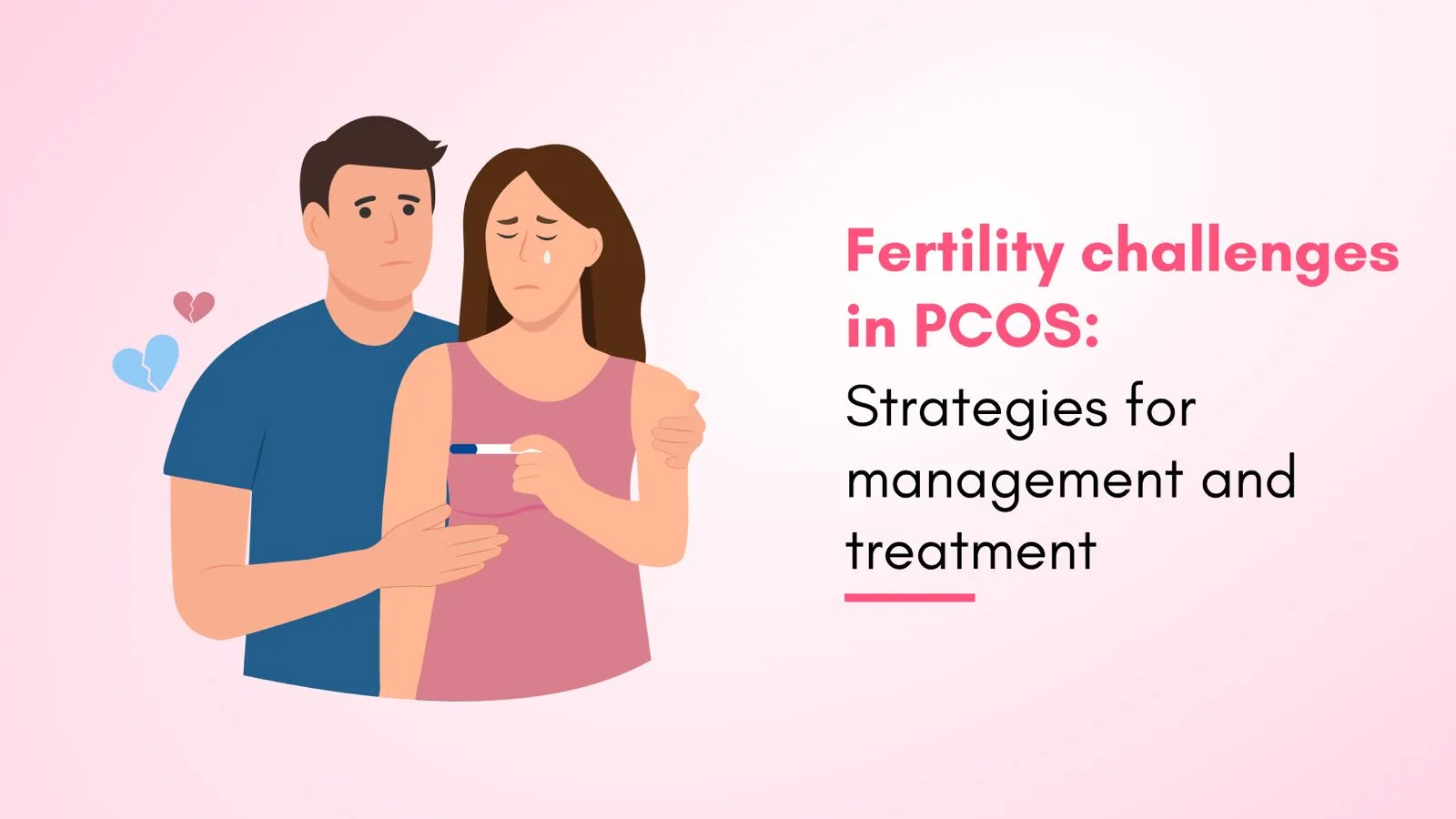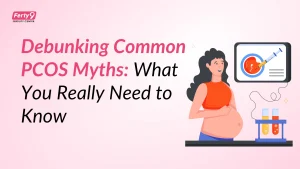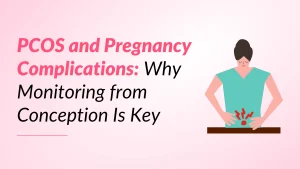There is a question that often comes to mind when a woman is going through late pregnancy or failure in conception- does she have PCOS, and does PCOS cause infertility? The reason for late and failed conceptions may differ from person to person, depending on various factors. However, PCOS (Polycystic Ovary Syndrome) is one of the widespread reasons for this, and there are many fertility challenges that a woman may face due to a delayed menstrual cycle.
If there is a disease or illness, there will be a treatment and solution for it, which applies to PCOS infertility, too. In this article, we will discuss the symptoms, treatments, therapies, natural remedies, and challenges associated with PCOD (Polycystic Ovarian Disease) or PCOS-related conception. So, read further to learn more.
Symptoms of PCOS (Polycystic Ovary Syndrome)
- Having irregular menstrual cycle or no periods at all.
- Skin gets oily, and acne can be seen all over.
- Trouble in getting pregnant.
- Gains weight rapidly and have difficulty with losing them.
- Body and facial hair starts to show up more.
- Loss of hair.
One of the biggest questions we have is, “Can PCOS cause infertility?”. Well! The answer is yes; it may affect pregnancy. However, these symptoms may vary from woman to woman, as some can be milder while others may be severe.
How Does PCOS Affect Fertility?
When a woman has polycystic ovary syndrome (PCOS), her hormones are either produced in a higher amount or lower, and this imbalance disrupts the reproductive system. If you are wondering does PCOS causes infertility, then here is a detail of how it impacts pregnancy.
It affects the normal menstrual cycle, interrupting the egg’s maturity that is released from the ovary during ovulation or anovulation. This may lead to inconsistent release of eggs, which reduces the chances of conception.
The male hormone, testosterone, is present in women, which is one of the leading causes of PCOS because, in such situations, they are produced in higher amounts. This imbalance disrupts the other hormones that are necessary for fertility, thus delaying the pregnancy.
While this presents conception challenges, various PCOS fertility treatment options are available, such as lifestyle changes, ovulation-inducing medications, and assisted reproductive technologies. These treatments can be personalized according to the symptoms that are observed in the individuals, thus managing PCOS-related fertility issues.
Common Fertility Challenges Associated With PCOS
Polycystic Ovary Syndrome (PCOS) is a common endocrine disorder that can pose significant challenges to fertility in affected individuals. Ovulation is one of the main challenges associated with PCOS infertility because the ovaries may not release eggs regularly and even not release them at all. When the eggs are not released regularly, it will affect the menstrual cycle, and thus, it will get harder to predict the fertile time for conception.
The increased levels of androgens and insulin resistance are another challenge that is associated with PCOS and fertility. These can also contribute to developing ovarian cysts that further interfere with normal ovulation, and the release of mature eggs may be affected. Insulin resistance can also cause an imbalance in hormone production and affect the body’s ability to regulate blood sugar.
Other than that, women may also have issues with obesity and weight management because it is easy to gain weight but hard to lose with PCOS. However, with the advancements in medical interventions, several PCOS fertility treatments have been introduced so that a woman can overcome the fertility-related challenges that individuals face. These treatments are tailored according to the condition of the patient.
Lifestyle Strategies for Managing PCOS-Related Fertility Issues
So, lifestyle changes like avoiding stress triggers, improving the sleep cycle, and eating healthy are needed. These three are the major pillars and driving forces behind the management of PCOS and also to increase the chances of women getting pregnant with PCOS.
The answer to does PCOS cause infertility is yes, it does, but with the right PCOS and fertility treatment, one can manage the issues related to it. Apart from medication, one of the keys that helps manage a disease is proper lifestyle strategies because they can prevent further complications.
Importance Of Maintaining A Healthy Weight
Maintaining weight is important because almost all women with PCOS and infertility are overweight, and that turns into obesity with time. This can be the door to many health problems apart from infertility, such as type 2 diabetes and cardiovascular diseases. One can always consult a dietitian and nutritionist for tailored dietary instructions to help manage weight.
Also Read: Managing Polycystic Ovary Syndrome (PCOS) Without Losing Weight
Dietary Considerations For Managing PCOS.
Since blood sugar increases during PCOS, doctors usually recommend eating a diet that is low in sugar and carbohydrates. Instead of sugar and carbohydrates, it is suggested that one consume fiber, vitamins, and healthy carbs to get ready for conception. Fruits and vegetables must be included in the diet, and caffeine must be avoided to manage PCOS.
Exercise And Physical Activity For PCOS Management
Regular exercise is important to burn calories and build muscle mass because it is easy to gain but hard to lose with PCOS. It also reduces the cholesterol level and thus helps balance the hormones in the body, which is necessary for the body if a woman is planning to get pregnant. This also makes the body active and helps fight against obesity, eventually lowering the PCOS infertility rate and increasing the chances of getting pregnant.
Medical Treatments for PCOS-Related Fertility Challenges
Ovulation-Inducing Medications
Some women often wonder if is it hard to get pregnant with PCOS. Well! It is somewhat difficult, but fortunately not impossible, to cure PCOS for a healthy pregnancy because of medical inventions.
One of the treatments that are given to women with PCOS is ovulation-inducing medications. The main goal of this treatment is to regulate ovulation and help the ovaries produce and release multiple eggs so that the chances of pregnancy increase. However, before treating the patient, it is made sure that her fallopian tubes are unblocked or open so that there won’t be any risk of an ectopic pregnancy.
In Vitro Fertilization (IVF) and Other Assisted Reproductive Technologies (ART)
When the fallopian tube of the woman is blocked or if she is having trouble with conception even after ovulation-induction medication, then IVF for PCOS treatment is recommended. When the fallopian tube is blocked, then the person cannot undergo ovulation induction. Otherwise, the pregnancy will take place outside the uterus.
In such cases, eggs are collected from her ovary and kept in a laboratory dish for fertilization. The attending doctor determines the best treatment for the patient after a proper diagnosis and checking of the underlying conditions.
Other Hormonal Treatments
Oral contraceptives, progestin, hair treatment, weight loss treatment, etc., are given to the woman so that she can pass through PCOS and ovulation tests, thus being in perfect shape for conception. Hormonal imbalance is one of the major symptoms of PCOS, and that leads to several other dysfunctions in the body, including infertility. So, it is necessary to maintain the hormones associated with the reproductive system and fertility.
Alternative And Complementary Therapies For PCOS And Fertility
Acupuncture
The answer to whether PCOS causes infertility must be clear now, as its treatments can increase the chances of pregnancy. However, alternative therapies can also be very helpful. PCOS mainly affects hormones and insulin resistance and increases inflammation.
Acupuncture is one of the best ways to address all these conditions. It also helps regulate the menstrual cycle and increase blood flow, which contributes to improved egg quality and ovulation.
Herbal Supplements and Natural Remedies
Herbs and natural supplements can help to regulate progesterone and estrogen levels in the body and prepare it for conception, which manages PCOS conditions. This resumes the ovary’s health and menstrual cycles, which are the reasons behind a woman’s pregnancy.
Changes in eating habits, including herbs like Aloe vera, Chamomile, Cinnamon, Ginseng, and Stachys Lavandulifolia, are some of the best and most effective in such cases.
Psychological And Emotional Support For Women With PCOS
After experiencing multiple failures in conception, a woman can be mentally and physically drained, and that is the time when she needs her partner’s support the most. Whether PCOS is the reason behind the delayed pregnancy or any other underlying condition, psychological and emotional support from a partner can motivate her to keep trying again.
Professional counseling during these times helps a lot because it can alleviate the pain and stress that she is going through because of her PCOS and infertility. Timely consultation and familial support can prevent her from having anxiety, depression, stress, and other psychological problems.
Conclusion
Hope now you have a clear answer to the query: does PCOS cause infertility? It is not something that cannot be treated or overcome. An effective management strategy is what the woman needs to deal with this PCOS or PCOD condition that affects her hormones, fertility, and overall lifestyle. There can be multiple reasons for the condition to occur. However, with timely and tailored treatment, medication, and therapies, a successful pregnancy can be achieved.




























